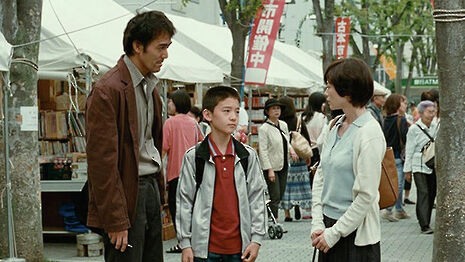Review: Seeing clearly ‘After the Storm’
With some unimpressive technical elements, Theo Howe looks beyond the surface to the profound drama presented in the heart of Japan.

Life’s a bitch. You’ll set goals, fail to meet most of them, and continue pushing on through in the hope to find the slightest shred of meaning. Hirokazu Koreeda has built his career on family dramas whose level of melancholy ranges from ‘rather sad’ to ‘Marley and Me rewritten by Kierkegaard’. After the Storm doesn’t offer a huge amount of hope in its portrayal of a man who seemingly has a family history of being irredeemable as he does numerous immoral things to at least provide his son with something resembling a positive vision of him.
“An intimate portrayal of the constant fear of disappointment and the downward spirals that can result from this.”
About a third of the way into the film, there is a brief shot of the interior of Ryota (Hiroshi Abe) entering his house, numerous copies of his only successful literary work The Empty Table stacked high, along with used coffee filter packs that he is forced to recycle to give him the energy to work through the night. Ryota is surrounded by symbols of both his wasted potential and his current awfulness.
Throughout After the Storm Koreeda shows his keen eye for symbolism, blankly presenting the audience with objects and allowing them to tell the story. It’s a film that serenely meanders from place-to-place, allowing each set-piece to occur and have the audience make what they will of it. It’s not a far cry from the style that Koreeda has cultivated since Nobody Knows, which might be disappointing to some people, but as Koreeda ages, he finds more and more interesting subjects to focus on.
Along with cultivating a style, Koreeda has done well to find a fantastic troupe of actors to work with. In fact, his partnership with Abe might be the best partnership in world. He is wonderfully nuanced, stoic, and flawed as the failing deadbeat dad. Credit should also go to Kirin Kiki for playing his long-suffering mother and to Taiyou Yoshizawa, who is a revelation in his role as the child who is the victim of the sins of the father. As an audience we pray that he doesn’t go down the same path, but as he runs off to collect a stray lottery ticket we begin to have doubts.
As much as what happens on-screen is impressive, the technical aspects leave a lot to be desired. Koreeda’s editor clearly has a penchant for fading out which begins to grate and just feels incredibly lazy. Also, while After the Storm beautifully captures the landscape of urban Japan, the number of times that the same shots are used grows old very fast.
Within the drama of the film, though, the technical complaints come to feel more and more like nitpicks. Koreeda and his actors should be commended for creating such an intimate portrayal of the constant fear of disappointment and the downward spirals that can result from this. It’s almost painfully awkward as there seems to be no end to Ryota’s ineptitude, but you can’t help but watch; you hope for a glimmer of hope, for some sign of life that just maybe life isn’t such a bitch after all
 News / Right-wing billionaire Peter Thiel gives ‘antichrist’ lecture in Cambridge6 February 2026
News / Right-wing billionaire Peter Thiel gives ‘antichrist’ lecture in Cambridge6 February 2026 News / Cambridge students uncover possible execution pit9 February 2026
News / Cambridge students uncover possible execution pit9 February 2026 News / Epstein contacted Cambridge academics about research funding6 February 2026
News / Epstein contacted Cambridge academics about research funding6 February 2026 News / Man pleads guility to arson at Catz8 February 2026
News / Man pleads guility to arson at Catz8 February 2026 News / John’s duped into £10m overspend6 February 2026
News / John’s duped into £10m overspend6 February 2026









